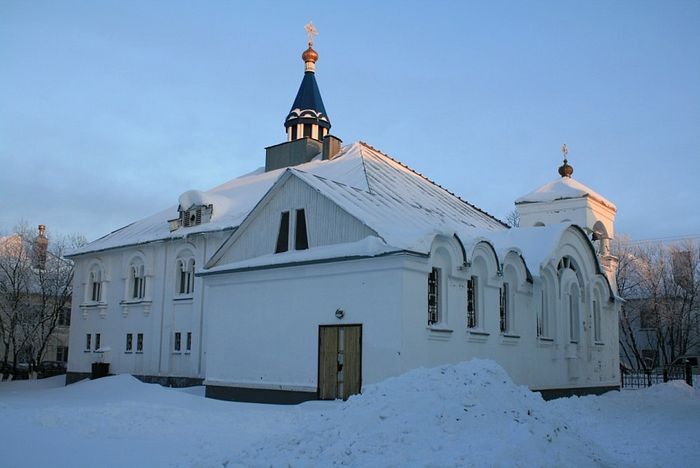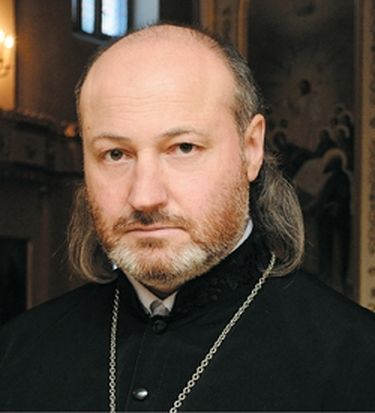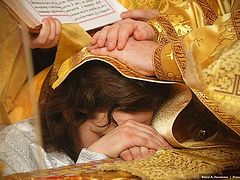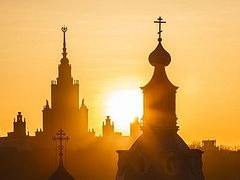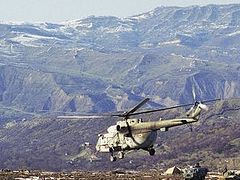Before sending our students of the Sretensky Theological Seminary on summer vacation, we gave them an assignment to meet Christians who are two or three generations older than the today’s youth and ask them about the main events of their lives in a country that first revolted against God but then tired of it and realized the vainness and futility of this rebellion; to ask these people of the older generation how they came to believe in God and preserved their faith, and what conclusions they arrived at as they reached the twilight of their lives. It must be said that all the students have coped with this task to their advantage and to the benefit of ourselves, their teachers and mentors. Absolutely all of their observations and notes were extremely interesting. We would like to introduce some of these works to our readers.
Editor-in-Chief, Pravoslavie.ru
***
Fr. Vadim Marinich serves at the Church of the Archangel Michael in the city of Vorkuta (in the extreme north of Russia in the Autonomous Republic of Komi). He is a retired Captain of the Special Rapid Response Unit; he earlier fought in two Chechen Wars. In his interview with Pravoslavie.ru the priest spoke about faith, patriotism and the upbringing of children.
—Fr. Vadim, can you introduce yourself and tell us where you are from?
—My surname is Marinich. My first name and patronymic are Vadim Vitalyevich. I serve as a priest in the city of Vorkuta, at the Church of the Archangel Michael. I was born in Ukraine, in a district center near the city of Odessa. I lived there till the age of six, after which my parents and I moved to the city of Vorkuta where I have lived since then.
—Did you began to attend church from your childhood?
—Yes, it was in my early childhood that my grandmother began to take me to church. It was even not really a church; it was a church-chapel attached to a cemetery. In that era of persecutions all large churches and cathedrals were closed, so both the clergy and laity had to go through very hard times. It was extremely difficult to survive for anyone who believed in our Lord Jesus Christ.
I am indebted to my grandma for this: it was she who taught me to pray and not to be ashamed to make a sign of the cross when I felt it was necessary. I used to see her praying in the mornings and evenings in front of her icons. I still keep these icons at home, although my granny passed away long ago. I do have vivid memories of the day when I received Communion for the first time: my granny took me to church where I confessed and was given Communion.
When we moved to Vorkuta we faced new difficulties as there was no active church in the city. So my school years went in a different way there. I cannot say that I prayed all the time. But I tried to pray, in my own way… And I did think about God. But we used to go back to my granny for my summer holidays where, as usual, my grandma and I attended the same little church regularly. It was wonderful when we managed to go to Paschal services! I well remember that teachers used to make records about students who went to church on major festivals; there were also “Pioneer patrols”; the system was very strict.
—Did you have to hide your faith while communicating with your peers?
I cannot say that my faith manifested itself intensely at that time. I associated with other boys as any teenager did. We would walk, joke, fight… We even smoked in the fifth and sixth grades. There lived Stundists [members of sectarian religious groups founded in the south of Russia in the nineteenth century] nearby; they did have very strict discipline. They refused to become Pioneers or Komsomol members and lived quite solitarily. I was amazed by their way of life.
This is how they lived… Unlike me, for whom Pavel/Pavka Korchagin [the central character of the socialist realist novel by Nikolai Ostrovsky, How the Steel Was Tempered] was an example to be followed; only much later did I learn that Korchagin was a militant atheist. I was inspired by his conduct, his selflessness and commitment to his cause, as I lived at that time in that world. Our brains were clogged with communism; or to be more exact, with socialism. We lived in that reality and it had a strong impact on us. For instance, I was the first in my class to become a Komsomol member, but this did not prevent me from going to church with my grandma when I visited her. All of this occurred simultaneously. I cannot explain why it happened like this. I wouldn’t say that I was a very zealous Komsomol member. I simply liked the idea of devoting all your energies to “a good cause”, like Pavka Korchagin, to work for the good of the people, to do something useful. This idea appealed to me greatly. And I tried to put it into practice in the army and in my life in general.
—When did it occur to you that you must dedicate your life to the army? Was it related to your religious faith or the reason was different?
—Yes, to be a defender of your fatherland—that was always of prime importance to me. Many members of our family were military men, seamen, civil sailors. Initially I even wanted to dedicate my life to the Navy. I joined the naval school in Odessa on three occasions. When, after the army, I succeeded in entering Odessa Maritime Academy, I had to leave it a week later due to some circumstances. Thus I quit my maritime career, yet I couldn’t imagine my life without military insignia. Soon after that I got married and then became a policeman.
—And where could anyone get the Bible or other spiritual literature at that time?
—Nowhere. I remember that I borrowed the Old and New Testaments from our neighbors, the Stundists whom I mentioned above, tried to read them, but couldn’t get far. Not long after I was helping another neighbor of mine about the house, this time an elderly Orthodox lady, when I spotted a very old beautiful Psalter that she used to read. I was fascinated by those interesting, peculiar Church Slavonic letters, which I then couldn’t understand! Apart from this, it was impossible to get any other spiritual literature. I gained my knowledge mostly from conversations with my grandparents.
—In your view, what are the differences between the Christians of that period and those living today?
—I remember that at that time the church was packed with people! I would sit down on the solea next to my granny because otherwise there was no free space in the church – and thus I would sit there through the service. Today the situation is peaceful, there are no persecutions, and there are a great number of active churches. But much fewer believers come to pray. At that time people were afraid of going to church because they could “get it in the neck” for it. My uncle was a communist, and when his daughter was baptized he did not even enter the church and waited outside—although he was a seaman and a deeply religious person. No one could imagine any seafaring without the help of God, without the help of St. Nicholas the Wonderworker. Everyone had an icon of St. Nicholas. So people had to lead “double lives” in that era. Today we have freedom, but where are worshippers? There are almost no children in our churches, few young people in our churches. Who will pray for us when we die?
—Can you tell us about some miraculous events in your life that demonstrate the Lord’s providence?
—All my life is woven around such events! It is even providential that we are now sitting and talking together! I have two Chechen wars behind me with their constant special operations and so on. In the city of Grozny I had a blast injury that brought me back to my senses: I realized that there is life, and death… So all my life is like “extreme sports” in some sense. It is only through the Lord that I am still alive, that I am talking with you now… He has kept me probably because He needs me for some task… Maybe it was arranged for my ordination as a priest which took place two years ago, so now I stand before the Lord’s altar, though I realize my unworthiness.
—Could you please tell us about your decision to go to Chechnya?
—I had served in the police for a long time before that. It wouldn’t be correct to say that I “made a decision”—at that time I was experiencing real torments… I could neither eat nor sleep. When the war broke out just before New Year, I kept watching news reports. I thought to myself: “How can it be?! My colleague from the Special Purpose Police Unit (OMON in Russian) has gone there, while I am still here!” I could have easily retired then, but I said to myself, “I must serve here, in the Special Rapid Response Unit, at the Department for Combatting Organized Crime.” But they did not want to take me on for a long time: first there was no vacant position, then my education appeared to be “wrong”. I took all the possible training programs that they required. I knew of all the qualifying standards required for an officer of Special Purpose Units; they included gymnasium, hand-to-hand combat, firing practice… In the end I passed all their standards and thus I drove the heads of the Department for Combatting Organized Crime to the corner! They knew my characteristics and so took me on. Thus an ordinary policeman turned into an officer of the Department for Combatting Organized Crime. It was an honor for me to be sent to Chechnya, but when I arrived to Chechnya and became conscious of what that war was like, I felt ill at ease. I had been pursuing this goal for a long time, but as soon as I attained it I suddenly saw a very different picture. It was a real shock for me: “Will I be able to handle it and cope with it?” In addition to this, I had left my wife and son at home. I had simply confronted my wife with the accomplished fact: I was leaving for Chechnya.
—What was her reaction?
—What do you think, what could be her reaction, given the fact that her beloved husband was going to war?... However, she was a strong woman. She supported me in many ways and sometimes she concealed her deep concerns. But she responded to all my subsequent assignments with understanding. I don’t know, maybe I was wrong at some point… But, anyway, what’s done cannot be undone. It was my personal decision and I believe I was right. I don’t regret doing it at all. I really wanted to experience these things. When you see all this, the ruins, the corpses; when you feel like you are going mad or you have got into an unreal world… And I have sympathy for Chechen residents, too, because everything was destroyed in their republic. But it had to do with politics, and I wouldn’t talk about it now because it is odious and loathsome… I wish the politicians who were responsible for both wars could meet with those eighteen-year-old youths now… With the youths who were sent to those wars and became real men there. We, adults, who by that time had our own families, saw them and followed their example and learned from their experience how we ought to act during war.
—Do you think that the saying, “there are no atheists in the trenches,” is true?
—I always use this maxim. True, there are no atheists in the trenches. I took the people who went with me from Vorkuta to Chechnya to church all the time, even when I served as an officer of the Department for Combatting Organized Crime. And nobody refused to join me; I never had any problems with that. All of them realized that we are mortal; they feared that they might die at any moment, and that made them revaluate their lives.
—You have mentioned that you have a son. In your opinion, what is the most critical factor in the upbringing of children?
—Yes, I do have some experience in this area, and it is not only family experience. After retirement I began to educate young Cossacks of Vorkuta. There were around fifty young Cossacks under my care. We went to the gym, we went to church together, studied the Gospel and the history of Cossacks. With time, when I was ordained, I became aware that it was vital for young people to have a leader to follow. Many of them already have their own families and are building their lives in their own way, but they still call me and come to see me. And that is very good. They really need religious and patriotic education. These two cannot exist separately from each other. Patriotism and religion are the most fundamental things that we have! Orthodoxy – this is our ancestors, our grandfathers and great-grandfathers. These are the main things we can be proud of!
—In your judgment, what is the most important thing in the relationship between a husband and a wife?
—There must be love. But love may wane in marriage; in this case spouses should stir up this feeling in one another. They should respect each other and cultivate patience. What does it matter that you don’t something like in another person? You must love him for who he is instead of searching for new partners every day. My wife and I lived together for thirty years. We had various difficulties on our path, but it was love, respect and patience that ultimately prevented us from divorcing. I have a right to speak about this as I have life experience. Not long ago my spouse passed away…
—And the final question is perhaps the key one: What are the most important lessons you have learned in your life?
—Oh, I don’t know! I am now fifty but I feel as if I were a high-school graduate. Recently I met with my former classmates and I felt that the past thirty years were “erased” from my life, it seemed as if I had not lived through all these years. And now I have a feeling that my whole life is ahead of me and many things are left to be done. Maybe it is too early to sum it up, maybe the most important events which are in store for me are yet to happen, I don’t know. Undoubtedly, the crucial moment in my life was the war. I would make it the corner-stone of my past life. If I had not gone through all this, I would not have achieved much. I began to appreciate life, to value people for who they are, to believe… I learned that the Lord is always near, that it is necessary for us turn to Him for help at any moment. And what is in the store for us? I don’t rule out that one day there will be time when I can do much more… I don’t know. My life is full of extremes. I cannot live a quiet life. I believe it is the Lord Who vouchsafes me to be able to make cardinal decisions, to change situations very quickly. This is what our life is like: sometimes it seems that we have achieved something, but it turns out that we haven’t. Sometimes one or another event in your life cancels out the results achieved. At times the terrible memories of the war start haunting and tormenting me. But I live with it, I have no alternative. I don’t have any other life, and I wouldn’t like to have any other life!

